BUSM4615: Report on Managing Project Teams for Project Success
VerifiedAdded on 2022/08/25
|13
|2843
|31
Report
AI Summary
This report examines the critical aspects of managing project teams to ensure project success, drawing primarily from the construction industry context. It begins by defining project management and highlighting the importance of team management, emphasizing that effective team management is crucial for achieving project goals. The report then delves into key aspects of managing project teams, including tools and techniques such as observation, conflict management, and communication, with an emphasis on the role of communication, leadership, and decision-making. It then discusses the reasons why team management is necessary for project success, emphasizing that it brings leadership, direction, and optimal performance. The report further explores techniques and approaches, such as time management, effective communication, and delegation of roles. The report recommends an approach based on team collaboration and communication as key to successful project outcomes. It concludes by reinforcing the idea that collaboration and communication are essential to project success.

Running head: PM
Managing Project Teams
Name of Student
Name of University
Author Note
Managing Project Teams
Name of Student
Name of University
Author Note
Paraphrase This Document
Need a fresh take? Get an instant paraphrase of this document with our AI Paraphraser
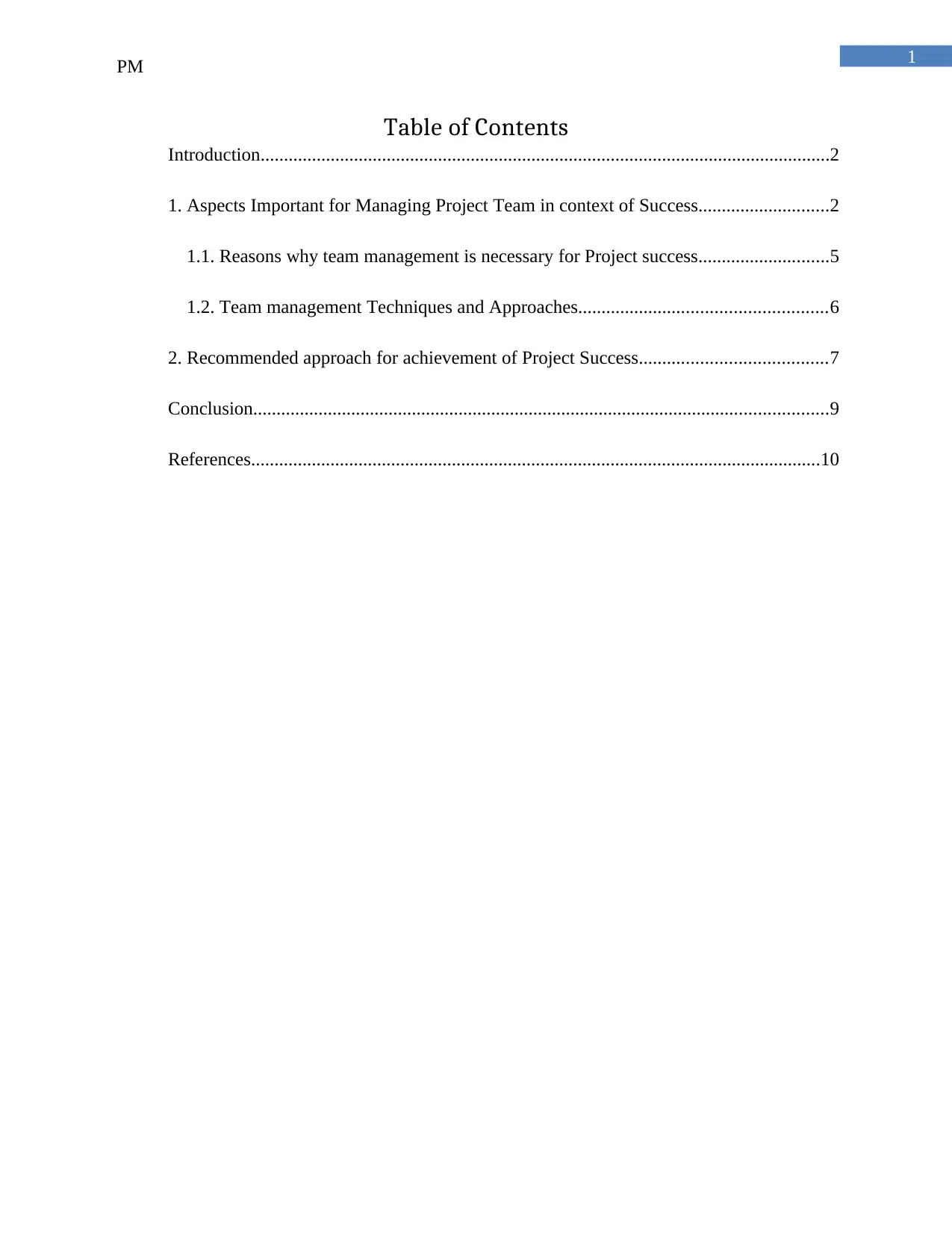
1
PM
Table of Contents
Introduction..........................................................................................................................2
1. Aspects Important for Managing Project Team in context of Success............................2
1.1. Reasons why team management is necessary for Project success............................5
1.2. Team management Techniques and Approaches.....................................................6
2. Recommended approach for achievement of Project Success........................................7
Conclusion...........................................................................................................................9
References..........................................................................................................................10
PM
Table of Contents
Introduction..........................................................................................................................2
1. Aspects Important for Managing Project Team in context of Success............................2
1.1. Reasons why team management is necessary for Project success............................5
1.2. Team management Techniques and Approaches.....................................................6
2. Recommended approach for achievement of Project Success........................................7
Conclusion...........................................................................................................................9
References..........................................................................................................................10
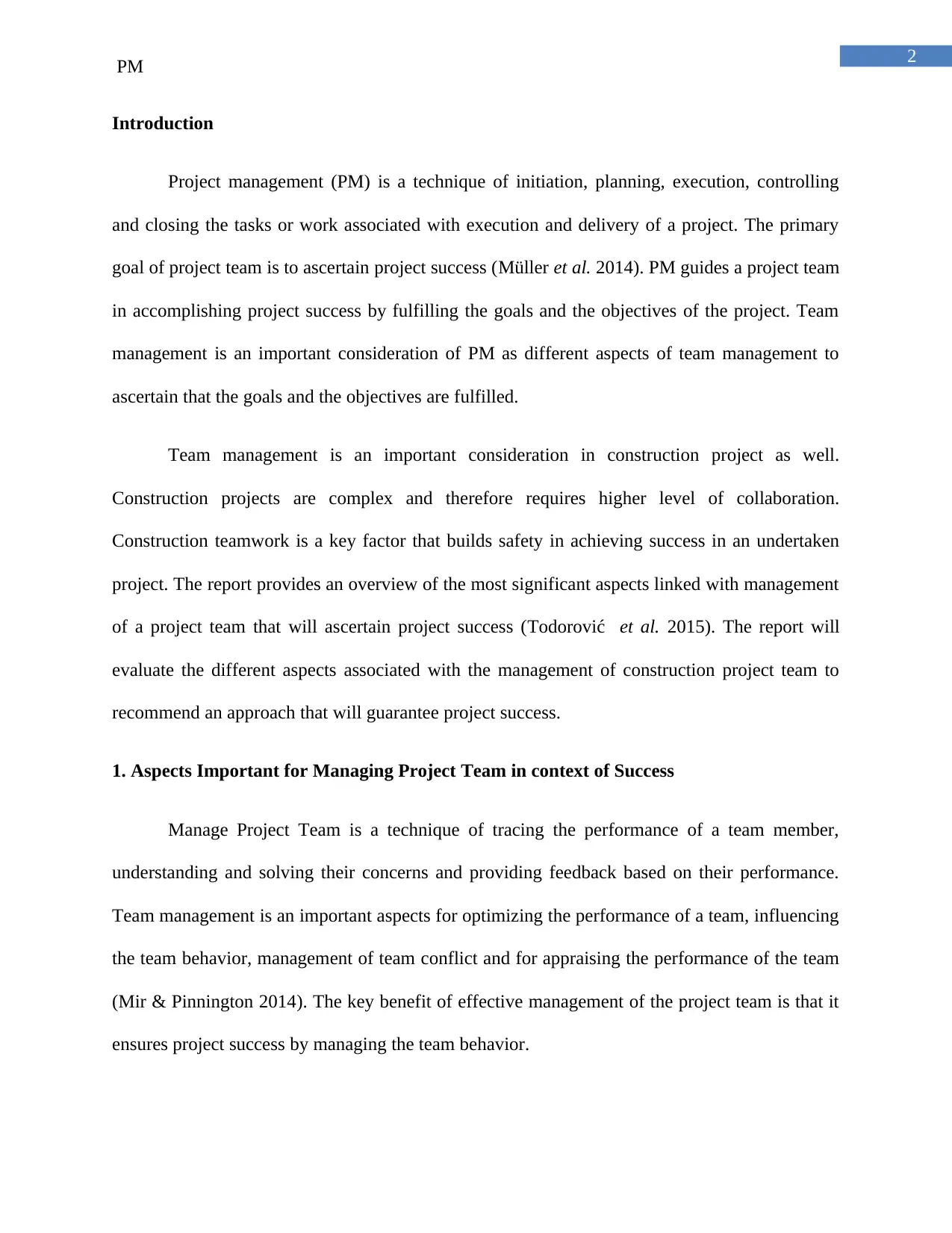
2
PM
Introduction
Project management (PM) is a technique of initiation, planning, execution, controlling
and closing the tasks or work associated with execution and delivery of a project. The primary
goal of project team is to ascertain project success (Müller et al. 2014). PM guides a project team
in accomplishing project success by fulfilling the goals and the objectives of the project. Team
management is an important consideration of PM as different aspects of team management to
ascertain that the goals and the objectives are fulfilled.
Team management is an important consideration in construction project as well.
Construction projects are complex and therefore requires higher level of collaboration.
Construction teamwork is a key factor that builds safety in achieving success in an undertaken
project. The report provides an overview of the most significant aspects linked with management
of a project team that will ascertain project success (Todorović et al. 2015). The report will
evaluate the different aspects associated with the management of construction project team to
recommend an approach that will guarantee project success.
1. Aspects Important for Managing Project Team in context of Success
Manage Project Team is a technique of tracing the performance of a team member,
understanding and solving their concerns and providing feedback based on their performance.
Team management is an important aspects for optimizing the performance of a team, influencing
the team behavior, management of team conflict and for appraising the performance of the team
(Mir & Pinnington 2014). The key benefit of effective management of the project team is that it
ensures project success by managing the team behavior.
PM
Introduction
Project management (PM) is a technique of initiation, planning, execution, controlling
and closing the tasks or work associated with execution and delivery of a project. The primary
goal of project team is to ascertain project success (Müller et al. 2014). PM guides a project team
in accomplishing project success by fulfilling the goals and the objectives of the project. Team
management is an important consideration of PM as different aspects of team management to
ascertain that the goals and the objectives are fulfilled.
Team management is an important consideration in construction project as well.
Construction projects are complex and therefore requires higher level of collaboration.
Construction teamwork is a key factor that builds safety in achieving success in an undertaken
project. The report provides an overview of the most significant aspects linked with management
of a project team that will ascertain project success (Todorović et al. 2015). The report will
evaluate the different aspects associated with the management of construction project team to
recommend an approach that will guarantee project success.
1. Aspects Important for Managing Project Team in context of Success
Manage Project Team is a technique of tracing the performance of a team member,
understanding and solving their concerns and providing feedback based on their performance.
Team management is an important aspects for optimizing the performance of a team, influencing
the team behavior, management of team conflict and for appraising the performance of the team
(Mir & Pinnington 2014). The key benefit of effective management of the project team is that it
ensures project success by managing the team behavior.
⊘ This is a preview!⊘
Do you want full access?
Subscribe today to unlock all pages.

Trusted by 1+ million students worldwide
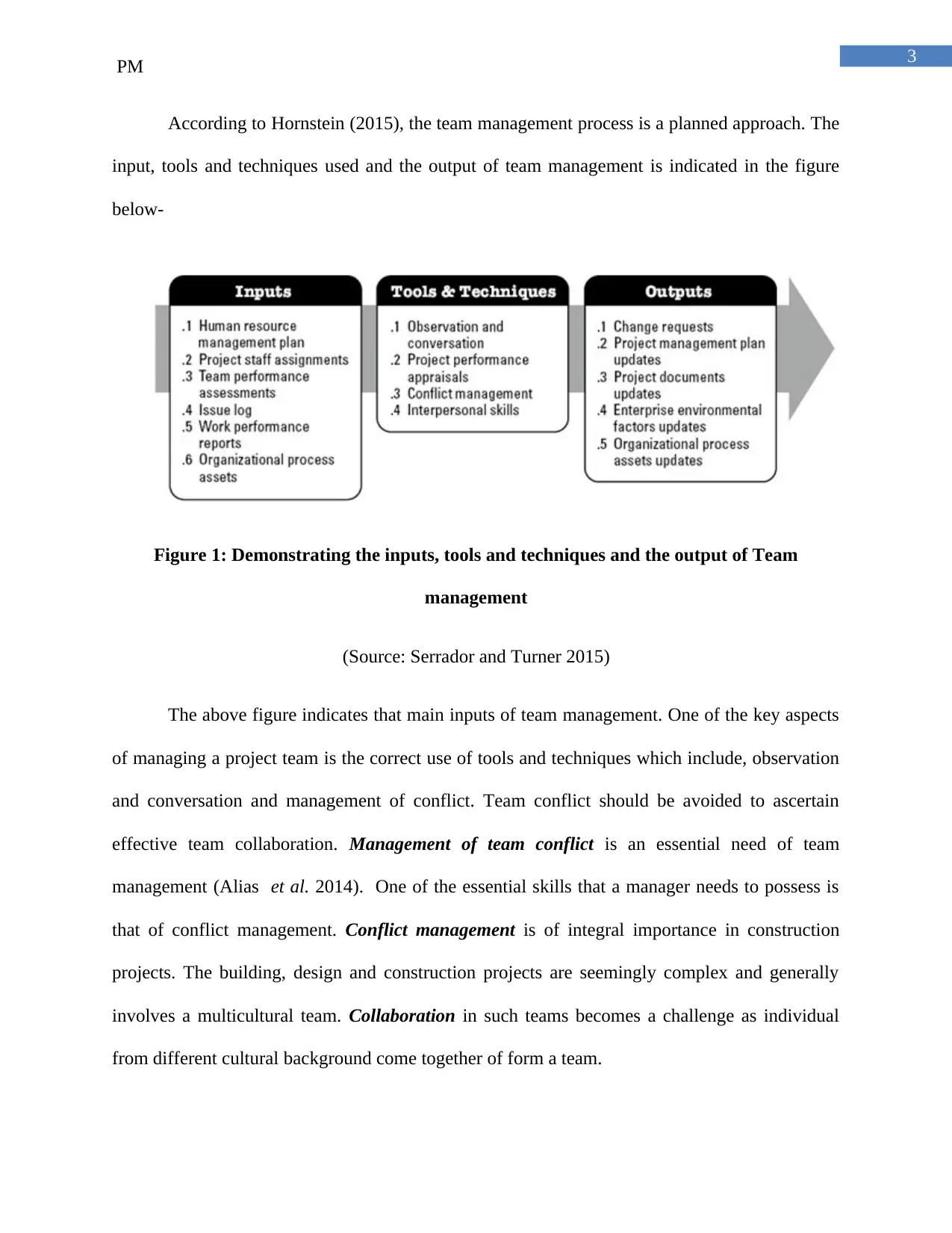
3
PM
According to Hornstein (2015), the team management process is a planned approach. The
input, tools and techniques used and the output of team management is indicated in the figure
below-
Figure 1: Demonstrating the inputs, tools and techniques and the output of Team
management
(Source: Serrador and Turner 2015)
The above figure indicates that main inputs of team management. One of the key aspects
of managing a project team is the correct use of tools and techniques which include, observation
and conversation and management of conflict. Team conflict should be avoided to ascertain
effective team collaboration. Management of team conflict is an essential need of team
management (Alias et al. 2014). One of the essential skills that a manager needs to possess is
that of conflict management. Conflict management is of integral importance in construction
projects. The building, design and construction projects are seemingly complex and generally
involves a multicultural team. Collaboration in such teams becomes a challenge as individual
from different cultural background come together of form a team.
PM
According to Hornstein (2015), the team management process is a planned approach. The
input, tools and techniques used and the output of team management is indicated in the figure
below-
Figure 1: Demonstrating the inputs, tools and techniques and the output of Team
management
(Source: Serrador and Turner 2015)
The above figure indicates that main inputs of team management. One of the key aspects
of managing a project team is the correct use of tools and techniques which include, observation
and conversation and management of conflict. Team conflict should be avoided to ascertain
effective team collaboration. Management of team conflict is an essential need of team
management (Alias et al. 2014). One of the essential skills that a manager needs to possess is
that of conflict management. Conflict management is of integral importance in construction
projects. The building, design and construction projects are seemingly complex and generally
involves a multicultural team. Collaboration in such teams becomes a challenge as individual
from different cultural background come together of form a team.
Paraphrase This Document
Need a fresh take? Get an instant paraphrase of this document with our AI Paraphraser
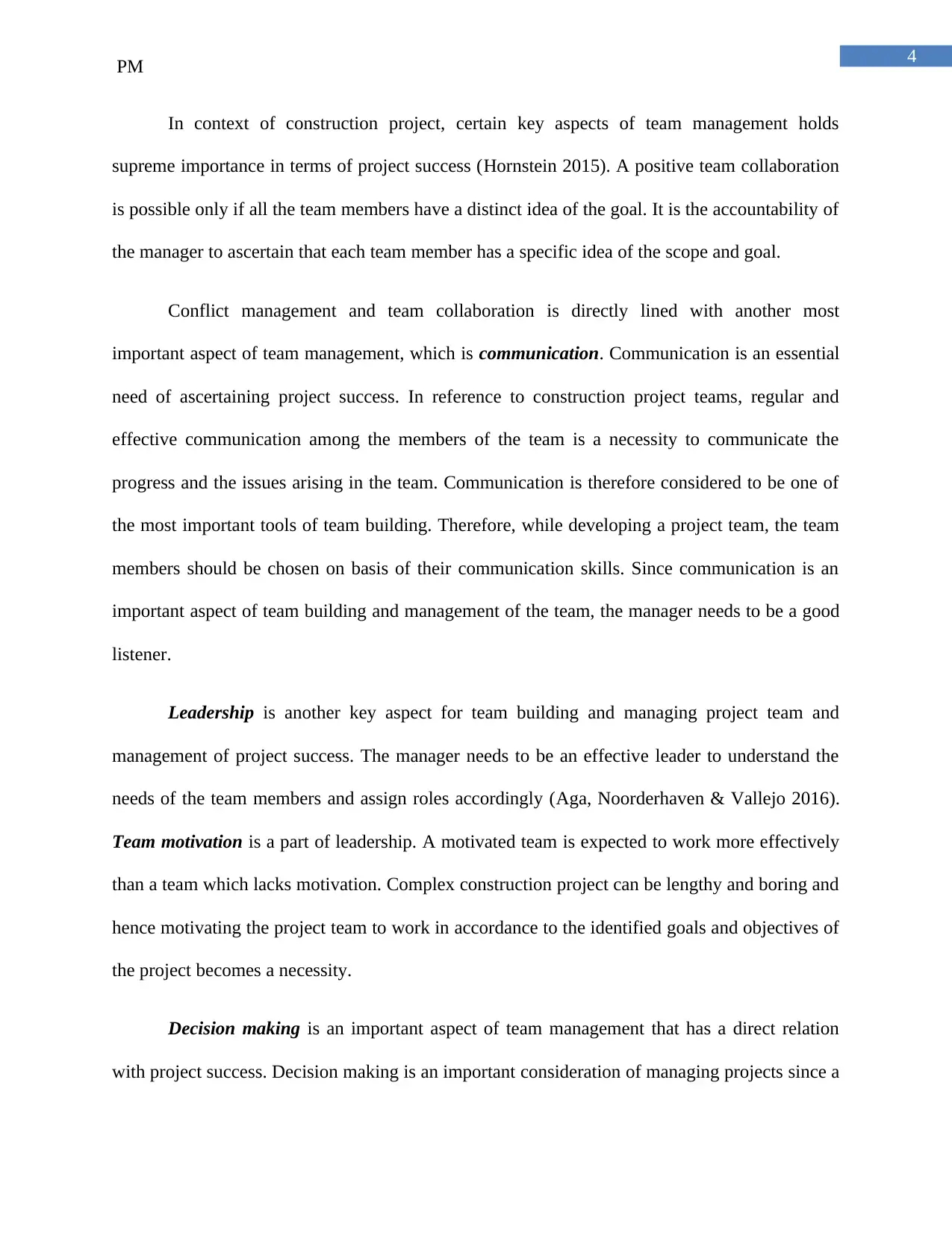
4
PM
In context of construction project, certain key aspects of team management holds
supreme importance in terms of project success (Hornstein 2015). A positive team collaboration
is possible only if all the team members have a distinct idea of the goal. It is the accountability of
the manager to ascertain that each team member has a specific idea of the scope and goal.
Conflict management and team collaboration is directly lined with another most
important aspect of team management, which is communication. Communication is an essential
need of ascertaining project success. In reference to construction project teams, regular and
effective communication among the members of the team is a necessity to communicate the
progress and the issues arising in the team. Communication is therefore considered to be one of
the most important tools of team building. Therefore, while developing a project team, the team
members should be chosen on basis of their communication skills. Since communication is an
important aspect of team building and management of the team, the manager needs to be a good
listener.
Leadership is another key aspect for team building and managing project team and
management of project success. The manager needs to be an effective leader to understand the
needs of the team members and assign roles accordingly (Aga, Noorderhaven & Vallejo 2016).
Team motivation is a part of leadership. A motivated team is expected to work more effectively
than a team which lacks motivation. Complex construction project can be lengthy and boring and
hence motivating the project team to work in accordance to the identified goals and objectives of
the project becomes a necessity.
Decision making is an important aspect of team management that has a direct relation
with project success. Decision making is an important consideration of managing projects since a
PM
In context of construction project, certain key aspects of team management holds
supreme importance in terms of project success (Hornstein 2015). A positive team collaboration
is possible only if all the team members have a distinct idea of the goal. It is the accountability of
the manager to ascertain that each team member has a specific idea of the scope and goal.
Conflict management and team collaboration is directly lined with another most
important aspect of team management, which is communication. Communication is an essential
need of ascertaining project success. In reference to construction project teams, regular and
effective communication among the members of the team is a necessity to communicate the
progress and the issues arising in the team. Communication is therefore considered to be one of
the most important tools of team building. Therefore, while developing a project team, the team
members should be chosen on basis of their communication skills. Since communication is an
important aspect of team building and management of the team, the manager needs to be a good
listener.
Leadership is another key aspect for team building and managing project team and
management of project success. The manager needs to be an effective leader to understand the
needs of the team members and assign roles accordingly (Aga, Noorderhaven & Vallejo 2016).
Team motivation is a part of leadership. A motivated team is expected to work more effectively
than a team which lacks motivation. Complex construction project can be lengthy and boring and
hence motivating the project team to work in accordance to the identified goals and objectives of
the project becomes a necessity.
Decision making is an important aspect of team management that has a direct relation
with project success. Decision making is an important consideration of managing projects since a
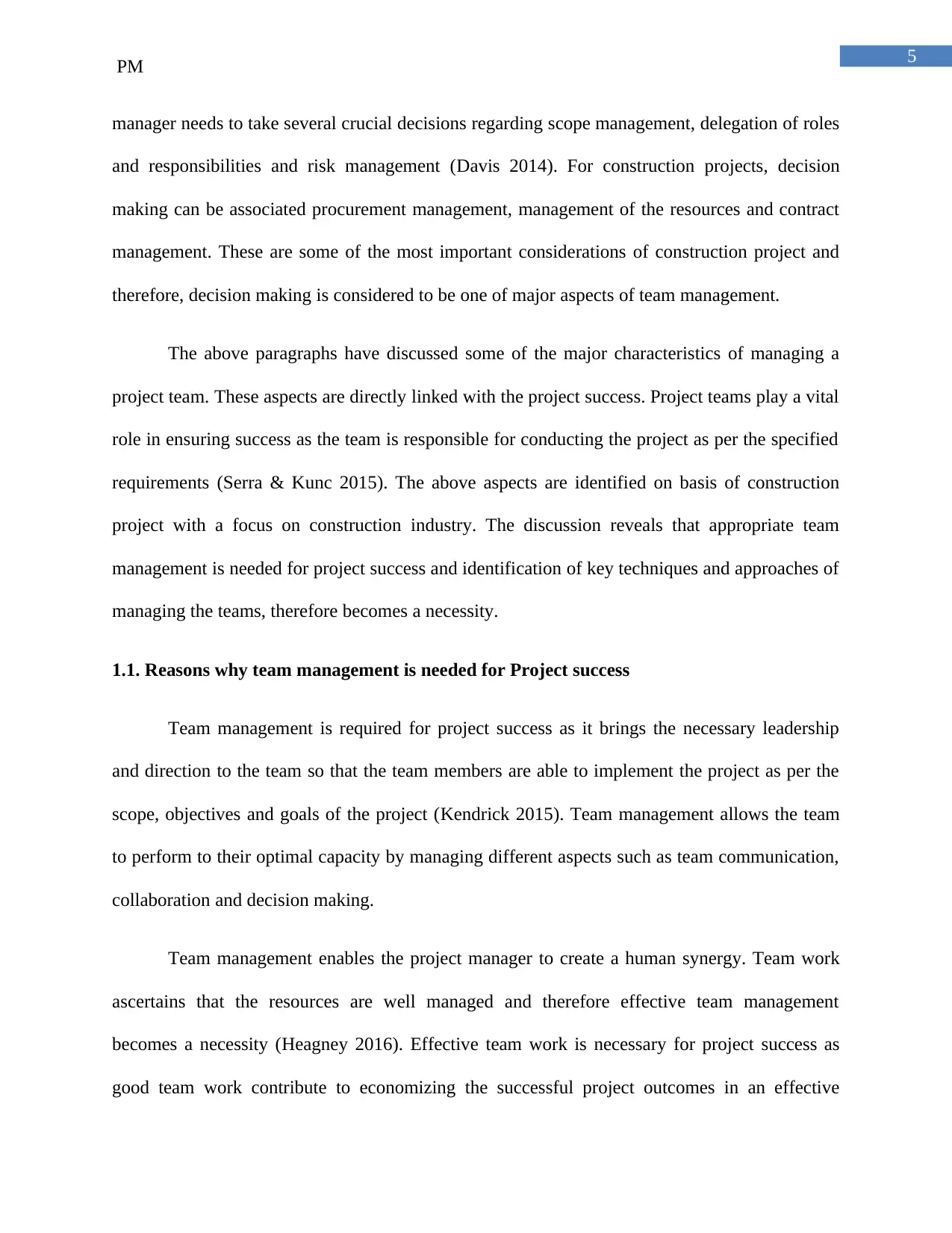
5
PM
manager needs to take several crucial decisions regarding scope management, delegation of roles
and responsibilities and risk management (Davis 2014). For construction projects, decision
making can be associated procurement management, management of the resources and contract
management. These are some of the most important considerations of construction project and
therefore, decision making is considered to be one of major aspects of team management.
The above paragraphs have discussed some of the major characteristics of managing a
project team. These aspects are directly linked with the project success. Project teams play a vital
role in ensuring success as the team is responsible for conducting the project as per the specified
requirements (Serra & Kunc 2015). The above aspects are identified on basis of construction
project with a focus on construction industry. The discussion reveals that appropriate team
management is needed for project success and identification of key techniques and approaches of
managing the teams, therefore becomes a necessity.
1.1. Reasons why team management is needed for Project success
Team management is required for project success as it brings the necessary leadership
and direction to the team so that the team members are able to implement the project as per the
scope, objectives and goals of the project (Kendrick 2015). Team management allows the team
to perform to their optimal capacity by managing different aspects such as team communication,
collaboration and decision making.
Team management enables the project manager to create a human synergy. Team work
ascertains that the resources are well managed and therefore effective team management
becomes a necessity (Heagney 2016). Effective team work is necessary for project success as
good team work contribute to economizing the successful project outcomes in an effective
PM
manager needs to take several crucial decisions regarding scope management, delegation of roles
and responsibilities and risk management (Davis 2014). For construction projects, decision
making can be associated procurement management, management of the resources and contract
management. These are some of the most important considerations of construction project and
therefore, decision making is considered to be one of major aspects of team management.
The above paragraphs have discussed some of the major characteristics of managing a
project team. These aspects are directly linked with the project success. Project teams play a vital
role in ensuring success as the team is responsible for conducting the project as per the specified
requirements (Serra & Kunc 2015). The above aspects are identified on basis of construction
project with a focus on construction industry. The discussion reveals that appropriate team
management is needed for project success and identification of key techniques and approaches of
managing the teams, therefore becomes a necessity.
1.1. Reasons why team management is needed for Project success
Team management is required for project success as it brings the necessary leadership
and direction to the team so that the team members are able to implement the project as per the
scope, objectives and goals of the project (Kendrick 2015). Team management allows the team
to perform to their optimal capacity by managing different aspects such as team communication,
collaboration and decision making.
Team management enables the project manager to create a human synergy. Team work
ascertains that the resources are well managed and therefore effective team management
becomes a necessity (Heagney 2016). Effective team work is necessary for project success as
good team work contribute to economizing the successful project outcomes in an effective
⊘ This is a preview!⊘
Do you want full access?
Subscribe today to unlock all pages.

Trusted by 1+ million students worldwide
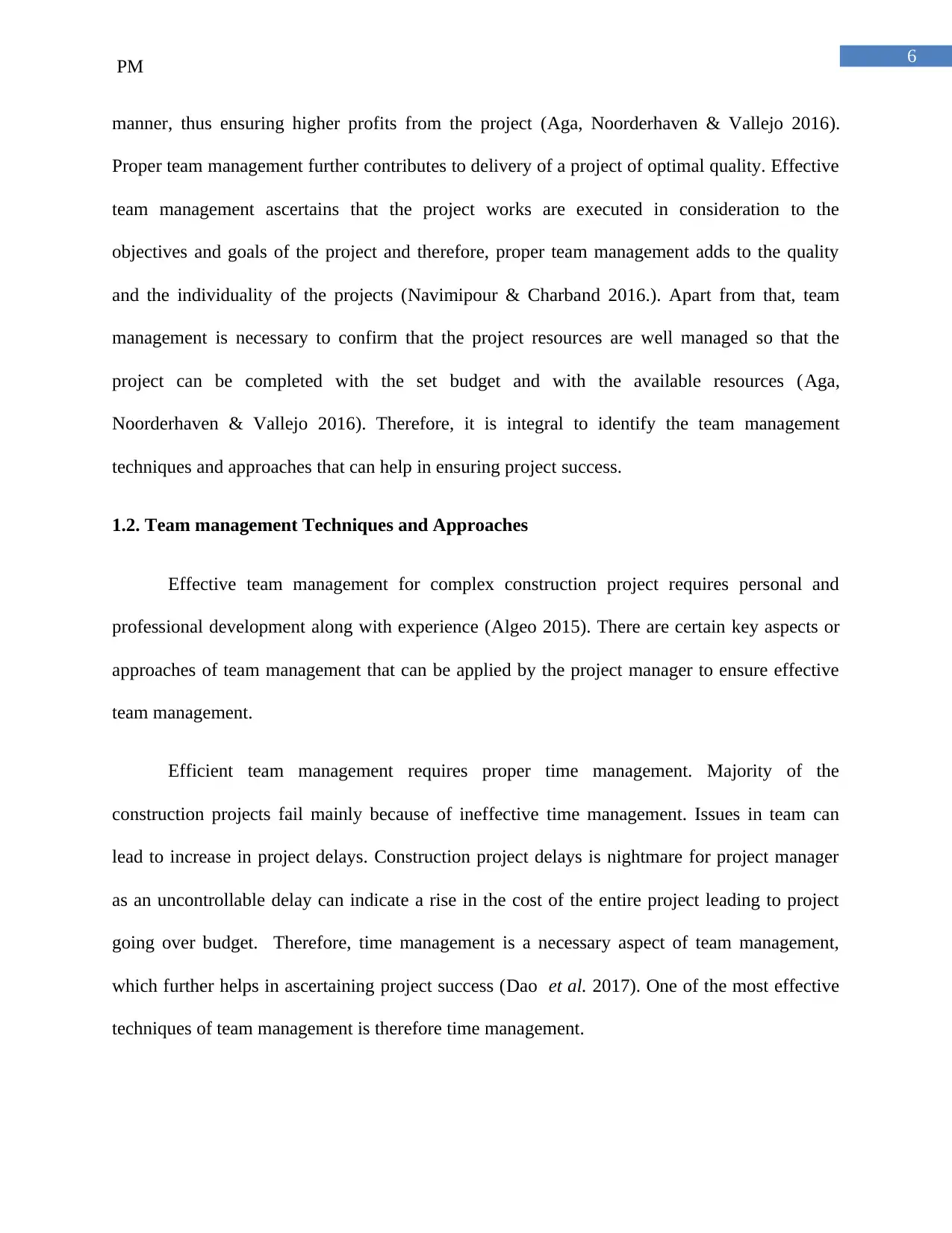
6
PM
manner, thus ensuring higher profits from the project (Aga, Noorderhaven & Vallejo 2016).
Proper team management further contributes to delivery of a project of optimal quality. Effective
team management ascertains that the project works are executed in consideration to the
objectives and goals of the project and therefore, proper team management adds to the quality
and the individuality of the projects (Navimipour & Charband 2016.). Apart from that, team
management is necessary to confirm that the project resources are well managed so that the
project can be completed with the set budget and with the available resources (Aga,
Noorderhaven & Vallejo 2016). Therefore, it is integral to identify the team management
techniques and approaches that can help in ensuring project success.
1.2. Team management Techniques and Approaches
Effective team management for complex construction project requires personal and
professional development along with experience (Algeo 2015). There are certain key aspects or
approaches of team management that can be applied by the project manager to ensure effective
team management.
Efficient team management requires proper time management. Majority of the
construction projects fail mainly because of ineffective time management. Issues in team can
lead to increase in project delays. Construction project delays is nightmare for project manager
as an uncontrollable delay can indicate a rise in the cost of the entire project leading to project
going over budget. Therefore, time management is a necessary aspect of team management,
which further helps in ascertaining project success (Dao et al. 2017). One of the most effective
techniques of team management is therefore time management.
PM
manner, thus ensuring higher profits from the project (Aga, Noorderhaven & Vallejo 2016).
Proper team management further contributes to delivery of a project of optimal quality. Effective
team management ascertains that the project works are executed in consideration to the
objectives and goals of the project and therefore, proper team management adds to the quality
and the individuality of the projects (Navimipour & Charband 2016.). Apart from that, team
management is necessary to confirm that the project resources are well managed so that the
project can be completed with the set budget and with the available resources (Aga,
Noorderhaven & Vallejo 2016). Therefore, it is integral to identify the team management
techniques and approaches that can help in ensuring project success.
1.2. Team management Techniques and Approaches
Effective team management for complex construction project requires personal and
professional development along with experience (Algeo 2015). There are certain key aspects or
approaches of team management that can be applied by the project manager to ensure effective
team management.
Efficient team management requires proper time management. Majority of the
construction projects fail mainly because of ineffective time management. Issues in team can
lead to increase in project delays. Construction project delays is nightmare for project manager
as an uncontrollable delay can indicate a rise in the cost of the entire project leading to project
going over budget. Therefore, time management is a necessary aspect of team management,
which further helps in ascertaining project success (Dao et al. 2017). One of the most effective
techniques of team management is therefore time management.
Paraphrase This Document
Need a fresh take? Get an instant paraphrase of this document with our AI Paraphraser
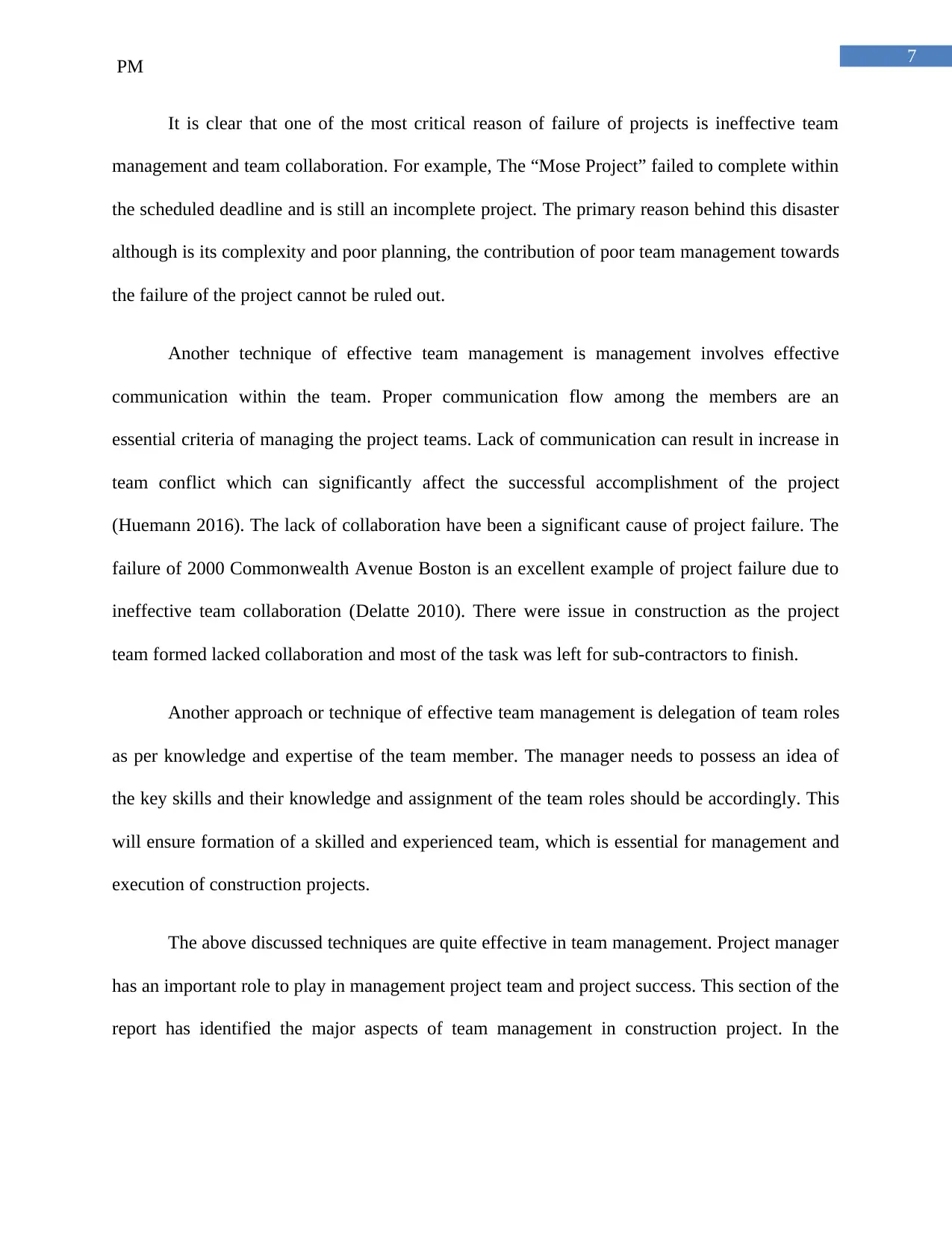
7
PM
It is clear that one of the most critical reason of failure of projects is ineffective team
management and team collaboration. For example, The “Mose Project” failed to complete within
the scheduled deadline and is still an incomplete project. The primary reason behind this disaster
although is its complexity and poor planning, the contribution of poor team management towards
the failure of the project cannot be ruled out.
Another technique of effective team management is management involves effective
communication within the team. Proper communication flow among the members are an
essential criteria of managing the project teams. Lack of communication can result in increase in
team conflict which can significantly affect the successful accomplishment of the project
(Huemann 2016). The lack of collaboration have been a significant cause of project failure. The
failure of 2000 Commonwealth Avenue Boston is an excellent example of project failure due to
ineffective team collaboration (Delatte 2010). There were issue in construction as the project
team formed lacked collaboration and most of the task was left for sub-contractors to finish.
Another approach or technique of effective team management is delegation of team roles
as per knowledge and expertise of the team member. The manager needs to possess an idea of
the key skills and their knowledge and assignment of the team roles should be accordingly. This
will ensure formation of a skilled and experienced team, which is essential for management and
execution of construction projects.
The above discussed techniques are quite effective in team management. Project manager
has an important role to play in management project team and project success. This section of the
report has identified the major aspects of team management in construction project. In the
PM
It is clear that one of the most critical reason of failure of projects is ineffective team
management and team collaboration. For example, The “Mose Project” failed to complete within
the scheduled deadline and is still an incomplete project. The primary reason behind this disaster
although is its complexity and poor planning, the contribution of poor team management towards
the failure of the project cannot be ruled out.
Another technique of effective team management is management involves effective
communication within the team. Proper communication flow among the members are an
essential criteria of managing the project teams. Lack of communication can result in increase in
team conflict which can significantly affect the successful accomplishment of the project
(Huemann 2016). The lack of collaboration have been a significant cause of project failure. The
failure of 2000 Commonwealth Avenue Boston is an excellent example of project failure due to
ineffective team collaboration (Delatte 2010). There were issue in construction as the project
team formed lacked collaboration and most of the task was left for sub-contractors to finish.
Another approach or technique of effective team management is delegation of team roles
as per knowledge and expertise of the team member. The manager needs to possess an idea of
the key skills and their knowledge and assignment of the team roles should be accordingly. This
will ensure formation of a skilled and experienced team, which is essential for management and
execution of construction projects.
The above discussed techniques are quite effective in team management. Project manager
has an important role to play in management project team and project success. This section of the
report has identified the major aspects of team management in construction project. In the
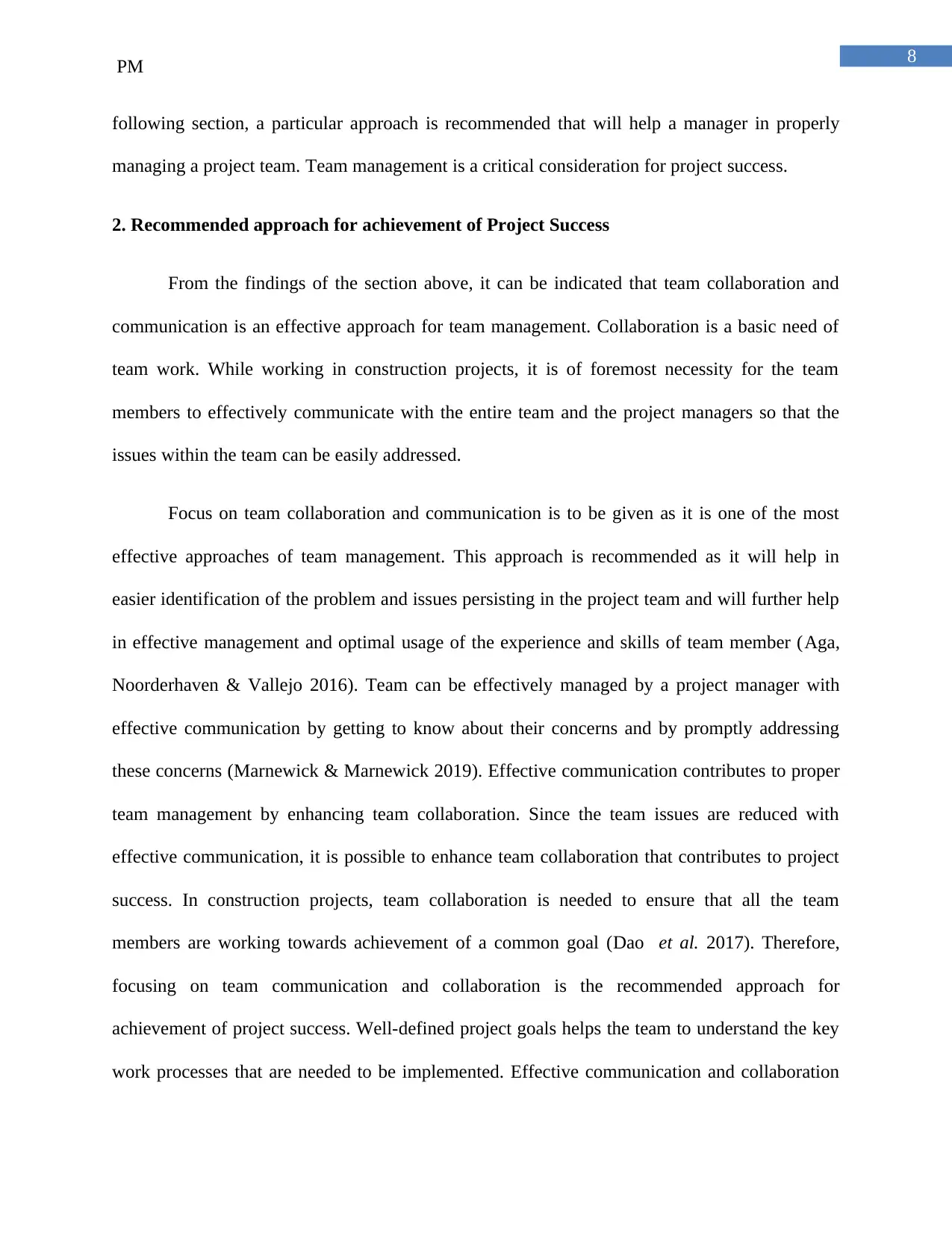
8
PM
following section, a particular approach is recommended that will help a manager in properly
managing a project team. Team management is a critical consideration for project success.
2. Recommended approach for achievement of Project Success
From the findings of the section above, it can be indicated that team collaboration and
communication is an effective approach for team management. Collaboration is a basic need of
team work. While working in construction projects, it is of foremost necessity for the team
members to effectively communicate with the entire team and the project managers so that the
issues within the team can be easily addressed.
Focus on team collaboration and communication is to be given as it is one of the most
effective approaches of team management. This approach is recommended as it will help in
easier identification of the problem and issues persisting in the project team and will further help
in effective management and optimal usage of the experience and skills of team member (Aga,
Noorderhaven & Vallejo 2016). Team can be effectively managed by a project manager with
effective communication by getting to know about their concerns and by promptly addressing
these concerns (Marnewick & Marnewick 2019). Effective communication contributes to proper
team management by enhancing team collaboration. Since the team issues are reduced with
effective communication, it is possible to enhance team collaboration that contributes to project
success. In construction projects, team collaboration is needed to ensure that all the team
members are working towards achievement of a common goal (Dao et al. 2017). Therefore,
focusing on team communication and collaboration is the recommended approach for
achievement of project success. Well-defined project goals helps the team to understand the key
work processes that are needed to be implemented. Effective communication and collaboration
PM
following section, a particular approach is recommended that will help a manager in properly
managing a project team. Team management is a critical consideration for project success.
2. Recommended approach for achievement of Project Success
From the findings of the section above, it can be indicated that team collaboration and
communication is an effective approach for team management. Collaboration is a basic need of
team work. While working in construction projects, it is of foremost necessity for the team
members to effectively communicate with the entire team and the project managers so that the
issues within the team can be easily addressed.
Focus on team collaboration and communication is to be given as it is one of the most
effective approaches of team management. This approach is recommended as it will help in
easier identification of the problem and issues persisting in the project team and will further help
in effective management and optimal usage of the experience and skills of team member (Aga,
Noorderhaven & Vallejo 2016). Team can be effectively managed by a project manager with
effective communication by getting to know about their concerns and by promptly addressing
these concerns (Marnewick & Marnewick 2019). Effective communication contributes to proper
team management by enhancing team collaboration. Since the team issues are reduced with
effective communication, it is possible to enhance team collaboration that contributes to project
success. In construction projects, team collaboration is needed to ensure that all the team
members are working towards achievement of a common goal (Dao et al. 2017). Therefore,
focusing on team communication and collaboration is the recommended approach for
achievement of project success. Well-defined project goals helps the team to understand the key
work processes that are needed to be implemented. Effective communication and collaboration
⊘ This is a preview!⊘
Do you want full access?
Subscribe today to unlock all pages.

Trusted by 1+ million students worldwide
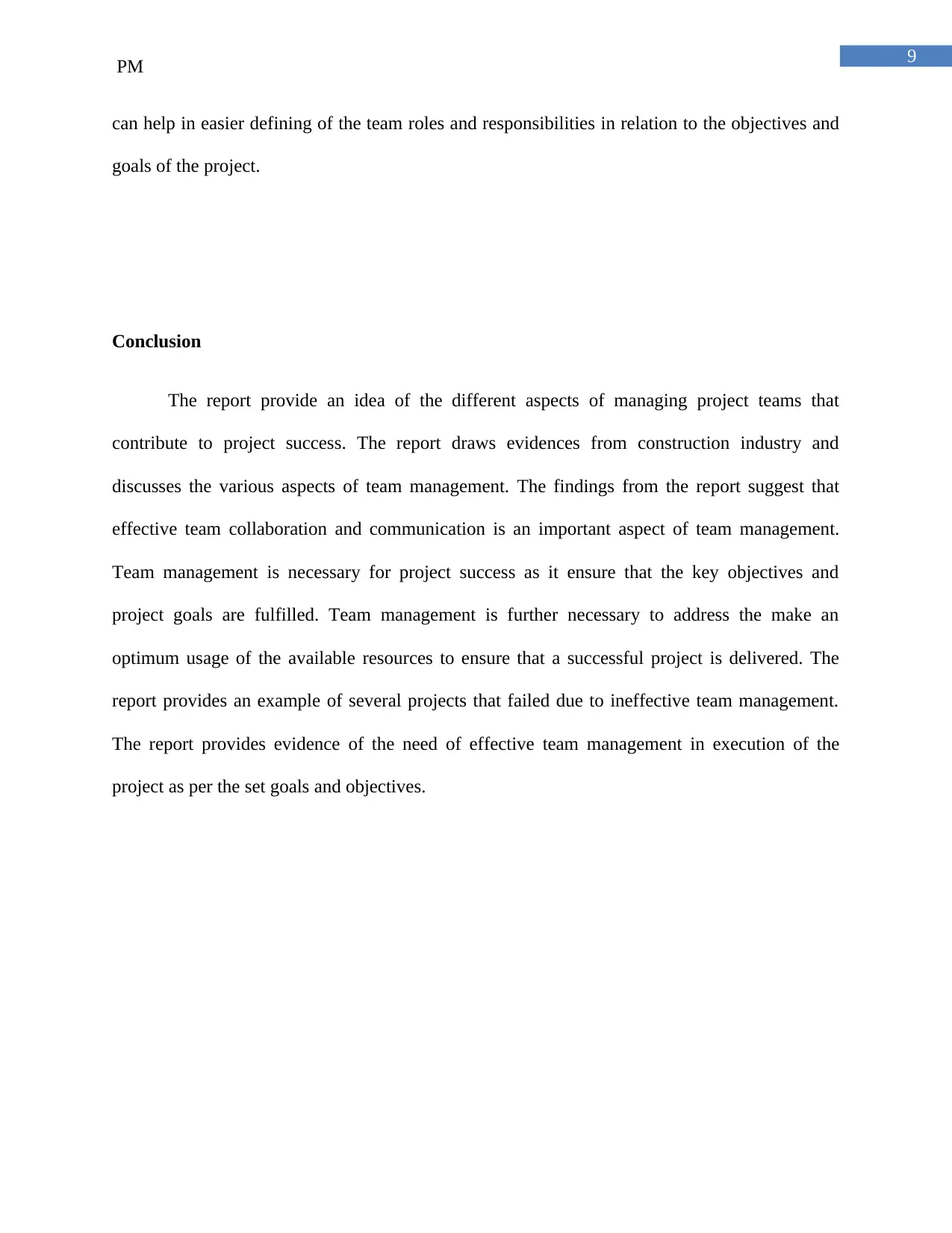
9
PM
can help in easier defining of the team roles and responsibilities in relation to the objectives and
goals of the project.
Conclusion
The report provide an idea of the different aspects of managing project teams that
contribute to project success. The report draws evidences from construction industry and
discusses the various aspects of team management. The findings from the report suggest that
effective team collaboration and communication is an important aspect of team management.
Team management is necessary for project success as it ensure that the key objectives and
project goals are fulfilled. Team management is further necessary to address the make an
optimum usage of the available resources to ensure that a successful project is delivered. The
report provides an example of several projects that failed due to ineffective team management.
The report provides evidence of the need of effective team management in execution of the
project as per the set goals and objectives.
PM
can help in easier defining of the team roles and responsibilities in relation to the objectives and
goals of the project.
Conclusion
The report provide an idea of the different aspects of managing project teams that
contribute to project success. The report draws evidences from construction industry and
discusses the various aspects of team management. The findings from the report suggest that
effective team collaboration and communication is an important aspect of team management.
Team management is necessary for project success as it ensure that the key objectives and
project goals are fulfilled. Team management is further necessary to address the make an
optimum usage of the available resources to ensure that a successful project is delivered. The
report provides an example of several projects that failed due to ineffective team management.
The report provides evidence of the need of effective team management in execution of the
project as per the set goals and objectives.
Paraphrase This Document
Need a fresh take? Get an instant paraphrase of this document with our AI Paraphraser
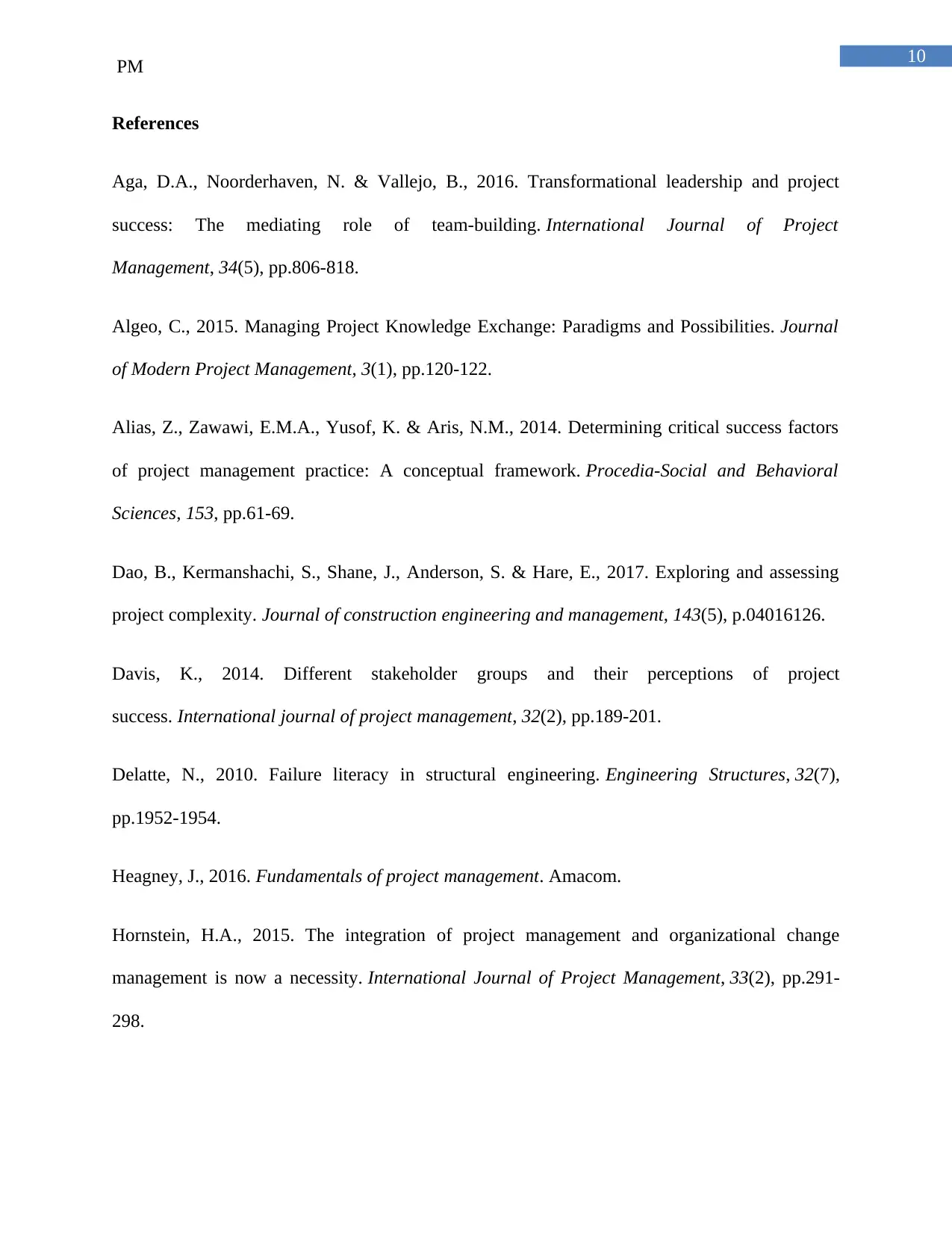
10
PM
References
Aga, D.A., Noorderhaven, N. & Vallejo, B., 2016. Transformational leadership and project
success: The mediating role of team-building. International Journal of Project
Management, 34(5), pp.806-818.
Algeo, C., 2015. Managing Project Knowledge Exchange: Paradigms and Possibilities. Journal
of Modern Project Management, 3(1), pp.120-122.
Alias, Z., Zawawi, E.M.A., Yusof, K. & Aris, N.M., 2014. Determining critical success factors
of project management practice: A conceptual framework. Procedia-Social and Behavioral
Sciences, 153, pp.61-69.
Dao, B., Kermanshachi, S., Shane, J., Anderson, S. & Hare, E., 2017. Exploring and assessing
project complexity. Journal of construction engineering and management, 143(5), p.04016126.
Davis, K., 2014. Different stakeholder groups and their perceptions of project
success. International journal of project management, 32(2), pp.189-201.
Delatte, N., 2010. Failure literacy in structural engineering. Engineering Structures, 32(7),
pp.1952-1954.
Heagney, J., 2016. Fundamentals of project management. Amacom.
Hornstein, H.A., 2015. The integration of project management and organizational change
management is now a necessity. International Journal of Project Management, 33(2), pp.291-
298.
PM
References
Aga, D.A., Noorderhaven, N. & Vallejo, B., 2016. Transformational leadership and project
success: The mediating role of team-building. International Journal of Project
Management, 34(5), pp.806-818.
Algeo, C., 2015. Managing Project Knowledge Exchange: Paradigms and Possibilities. Journal
of Modern Project Management, 3(1), pp.120-122.
Alias, Z., Zawawi, E.M.A., Yusof, K. & Aris, N.M., 2014. Determining critical success factors
of project management practice: A conceptual framework. Procedia-Social and Behavioral
Sciences, 153, pp.61-69.
Dao, B., Kermanshachi, S., Shane, J., Anderson, S. & Hare, E., 2017. Exploring and assessing
project complexity. Journal of construction engineering and management, 143(5), p.04016126.
Davis, K., 2014. Different stakeholder groups and their perceptions of project
success. International journal of project management, 32(2), pp.189-201.
Delatte, N., 2010. Failure literacy in structural engineering. Engineering Structures, 32(7),
pp.1952-1954.
Heagney, J., 2016. Fundamentals of project management. Amacom.
Hornstein, H.A., 2015. The integration of project management and organizational change
management is now a necessity. International Journal of Project Management, 33(2), pp.291-
298.
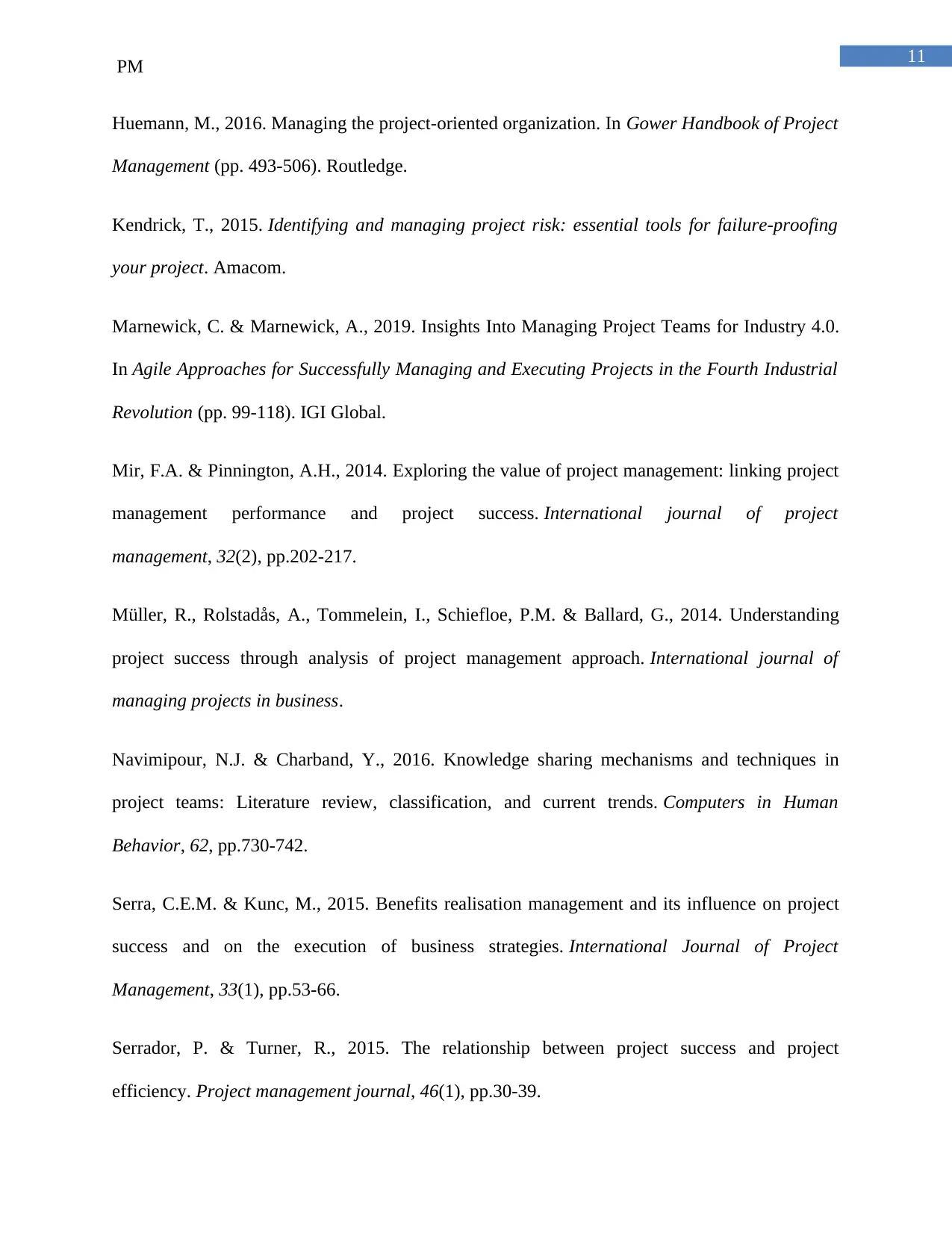
11
PM
Huemann, M., 2016. Managing the project-oriented organization. In Gower Handbook of Project
Management (pp. 493-506). Routledge.
Kendrick, T., 2015. Identifying and managing project risk: essential tools for failure-proofing
your project. Amacom.
Marnewick, C. & Marnewick, A., 2019. Insights Into Managing Project Teams for Industry 4.0.
In Agile Approaches for Successfully Managing and Executing Projects in the Fourth Industrial
Revolution (pp. 99-118). IGI Global.
Mir, F.A. & Pinnington, A.H., 2014. Exploring the value of project management: linking project
management performance and project success. International journal of project
management, 32(2), pp.202-217.
Müller, R., Rolstadås, A., Tommelein, I., Schiefloe, P.M. & Ballard, G., 2014. Understanding
project success through analysis of project management approach. International journal of
managing projects in business.
Navimipour, N.J. & Charband, Y., 2016. Knowledge sharing mechanisms and techniques in
project teams: Literature review, classification, and current trends. Computers in Human
Behavior, 62, pp.730-742.
Serra, C.E.M. & Kunc, M., 2015. Benefits realisation management and its influence on project
success and on the execution of business strategies. International Journal of Project
Management, 33(1), pp.53-66.
Serrador, P. & Turner, R., 2015. The relationship between project success and project
efficiency. Project management journal, 46(1), pp.30-39.
PM
Huemann, M., 2016. Managing the project-oriented organization. In Gower Handbook of Project
Management (pp. 493-506). Routledge.
Kendrick, T., 2015. Identifying and managing project risk: essential tools for failure-proofing
your project. Amacom.
Marnewick, C. & Marnewick, A., 2019. Insights Into Managing Project Teams for Industry 4.0.
In Agile Approaches for Successfully Managing and Executing Projects in the Fourth Industrial
Revolution (pp. 99-118). IGI Global.
Mir, F.A. & Pinnington, A.H., 2014. Exploring the value of project management: linking project
management performance and project success. International journal of project
management, 32(2), pp.202-217.
Müller, R., Rolstadås, A., Tommelein, I., Schiefloe, P.M. & Ballard, G., 2014. Understanding
project success through analysis of project management approach. International journal of
managing projects in business.
Navimipour, N.J. & Charband, Y., 2016. Knowledge sharing mechanisms and techniques in
project teams: Literature review, classification, and current trends. Computers in Human
Behavior, 62, pp.730-742.
Serra, C.E.M. & Kunc, M., 2015. Benefits realisation management and its influence on project
success and on the execution of business strategies. International Journal of Project
Management, 33(1), pp.53-66.
Serrador, P. & Turner, R., 2015. The relationship between project success and project
efficiency. Project management journal, 46(1), pp.30-39.
⊘ This is a preview!⊘
Do you want full access?
Subscribe today to unlock all pages.

Trusted by 1+ million students worldwide
1 out of 13
Related Documents
Your All-in-One AI-Powered Toolkit for Academic Success.
+13062052269
info@desklib.com
Available 24*7 on WhatsApp / Email
![[object Object]](/_next/static/media/star-bottom.7253800d.svg)
Unlock your academic potential
Copyright © 2020–2026 A2Z Services. All Rights Reserved. Developed and managed by ZUCOL.





